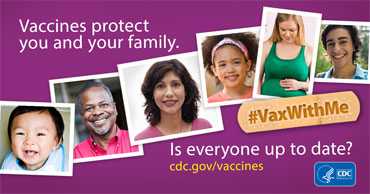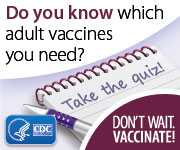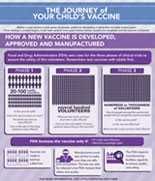Six Things YOU Need to Know about Vaccines
1. We all need vaccines throughout our lives to help protect against serious diseases.

Every year, tens of thousands of Americans get sick from diseases that could be prevented by vaccines – some people are hospitalized, some even die. Immunization is our best protection against these diseases. Vaccines are recommended for children, teens, and adults based on different factors like age, health conditions, lifestyle, jobs, and travel. CDC and other medical experts update vaccine recommendations every year based on the latest research and science. Vaccination is a critical step in protecting those that are most vulnerable to illness – infants and young children, the elderly, and those with chronic conditions and weakened immune systems.
2. Outbreaks of vaccine-preventable diseases can and do still happen in communities across the U.S.
Vaccines have greatly reduced infectious diseases that once regularly harmed or killed many infants, children, and adults. However, the germs that cause vaccine-preventable disease still exist and can be spread to people who are not protected by vaccines. For example, even though measles was declared to be eliminated from the U.S. in 2000, it is still common in other countries. Unvaccinated travelers have gotten measles while abroad spread the disease to others in the U.S. when they have returned, leading to a number of outbreaks in recent years.
Vaccination is important because it not only protects the person who gets the vaccine, but also helps to keep diseases from spreading to others, like family members, neighbors, classmates, and other members of your communities.
3. CDC and FDA take many steps to make sure vaccines are very safe.
Before a vaccine is approved for use in the U.S., it goes through years of careful testing to make sure it is safe and effective. Highly trained scientists and doctors at the U.S. Food and Drug Administration (FDA) evaluate the results of these clinical studies. FDA also inspects the sites where vaccines are made to make sure they follow strict manufacturing guidelines. Once a vaccine is licensed, FDA and CDC continue to monitor its use and make sure there are no safety concerns.
Like any medication, vaccines can cause side effects. In most cases, side effects are mild (e.g., soreness where the shot was given) but go away within a few days. Severe, long-lasting side effects from vaccines are rare.
4. Vaccines give you the power to protect your children from getting sick.
Immunization has had an enormous impact on improving the health of children in the United States. Most parents today have never seen first-hand the devastating consequences that vaccine-preventable diseases have on a child, a family, or community. Protecting your child’s health and safety is very important. That’s why most parents choose immunization — it’s a powerful defense that’s safe, proven, and effective.
Vaccination is one of the best ways parents can protect infants, children, and teens from 16 potentially harmful diseases. Vaccine-preventable diseases can be very serious, may require hospitalization, or even be deadly — especially in infants and young children. To see if your child is up-to-date, visit our parents’ page and talk to your doctor.
5. You can even make sure your baby is born with protection by getting vaccinated when you are pregnant.
You probably know that when you are pregnant, you share everything with your baby. That means when you get vaccinated, you aren’t just protecting yourself—you are passing some protection on to your baby in the first few months of life when they are too young to build immunity on their own. CDC recommends you get whooping cough and flu vaccines during each pregnancy to help protect yourself and your developing baby. For more information you can visit our maternal vaccination page and talk to your doctor at your next appointment.
6. Vaccines aren’t just for kids. They can help adults stay healthy too – especially if they have health conditions.

Even if you got all your vaccines as a child, the protection from some vaccines can wear off over time. You may also be at risk for other diseases due to your age, job, lifestyle, travel, or health conditions. Adults with chronic conditions like asthma/COPD, heart disease, and diabetes are more likely to get complications from certain diseases. Vaccination is an important part of staying healthy. Getting sick is not fun at any age – and for adults it can mean medical bills, missed work, and not being able to take care of family.
Take this quick quiz to find out what vaccines may be recommended for you – and discuss the results with your healthcare professional to make sure you are up to date!
- Page last reviewed: March 10, 2017
- Page last updated: August 31, 2016
- Content source:


 ShareCompartir
ShareCompartir


